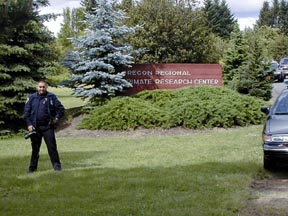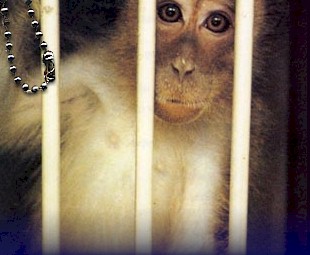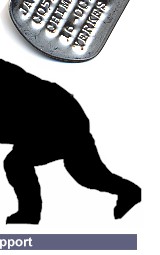Oregon National Primate
Research Center
If ORPRC or ONPRC is the last line of information
on your Primate Freedom Tag, that means you have a personal connection
with a primate currently imprisoned in Beaverton, Oregon. There
are hundreds of people wearing Primate Freedom Tags from ORPRC.
In January of 1999, the Oregon Regional Primate Research Center
listed 2,365 living primates in their laboratory including white-fronted
capuchins, brown capuchins, stump-tailed macaques, Japanese macaques,
rhesus macaques, crab-eating macaques and squirrel monkeys. Thousands
are living in solitary confinement.
Every morning is the same for these innocent monkeys. They awake
to the sounds of the laboratory: the clanging of metal doors, keys,
electronic devices, and the cries and whimpers of their fellow prisoners.
 authorities resort to intimidation by videotaping everyone who stands
and speaks in opposition to the cruelties being performed behind
the guarded walls of all such institutions. Watching us doesn't
hurt. Cutting into the primates does.
authorities resort to intimidation by videotaping everyone who stands
and speaks in opposition to the cruelties being performed behind
the guarded walls of all such institutions. Watching us doesn't
hurt. Cutting into the primates does.
Most are unable to see the primates beside them, since the cages
are shrouded with metal on three sides, leaving only one view --
the view of the inside of the lab.
What was their crime?
Almost all the experiments conducted at ONPRC are funded by the
National Institutes of Health. Most researchers (e-mail addresses
provided) are conducting many studies at any one time.
It is almost impossible to list every experiment occurring at ORPRC
due to the millions of dollars flowing from your wallet into the
pockets of the researchers at this institution. More experiments
are started almost daily as the old ones prove to be deadends and
the federal government entices the experimenters to try something
new by offering them more money.
AXTHELM, MICHAEL K. investigates endemic diseases in the ORPRC
monkey colonies.
BETHEA, CYNTHIA L. (betheac@ohsu.edu)
considers the effects of estrogen on hormone production in rhesus
macaques and induces experimental infection of the amniotic chamber
in chronically instrumented pregnant rhesus monkeys. (Meet
Cynthia!)
BRENNER, ROBERT M. investigates female reproductive system functioning
in rhesus macaques and induces artificial menstrual cycles in ovarectomized
juvenile rhesus macaques.
BROGAN, REBECCA S. studies lactation in primates.
CAMERON, JUDY L. (cameronj@ohsu.edu
) monitors effects of fasting and re-feeding on testosterone production
in male rhesus macaques and creates stress-induced suppression of
reproductive function in crab-eating macaques. (Meet
Judy!)
CASEY, DANIEL E. documents the crippling side effects of anti-psychotic
drugs in a group of 39 capuchin monkeys.
CHAFFIN, CHARLES L. studies ovulation in rhesus macaques.
CONN, PAUL M. (connm@ohsu.edu)
considers gonadotropin releasing hormone (GnRH ) action in rats
and rabbits. (Meet
Paul!)
EATON, G. GRAY conducts experiments dealing with the pharmacological
treatment of self-biting caused by solitary confinement in male
rhesus macaques.
GRAVETT, MICHAEL G. induces birth prematurity in chronically instrumented
pregnant rhesus macaques through experimental intrauterine infections.
[Chronic instrumentaion is the term used when monitoring devices
are permanently surgically implanted. Typically, monkeys used in
this manner are permanently tethered and housed in isolation.]
GROVE, KEVIN L. (grovek@ohsu.edu):
induces seizures in lactating rats.
HERMSMEYER, R. KENT (herms@ohsu.edu
or rkh@compuserve.com) examines
the effects of hormones on intentionally damaged coronary arteries
in rhesus macaques.
HESS, DAVID L. studies the effects of lead on testicular function
in rabbits. (Meet
David!)
KODAMA, TOSHIAKI infects rhesus macaques with SIV.
LENTZ, STEVE documents the effects of vitamins on experimentally
impaired vascular function in crab-eating macaques.
ACHIDA, CURTIS A. studies gene expression in rat and macaque heart
tissue in response to various hormones and infects rhesus macaques
with SIV.
MATRISIAN, LYNN M. investigates hormonal manipulation of induced
menses in spayed female rhesus macaques.
MENG, LI. is cloning rhesus macaques.
NEURINGER, MARTHA (neuringe@ohsu.edu)
deprives infant rhesus macaques of key nutrients and studies the
results such as chronic diarrhea and neural impairment.
NOVY, MILES J. ( haluskag@ohsu.edu)
is engaged in physiological studies of "unanesthetized chronically
catheterized maternal-fetal preparations" ( pregnant baboons
and rhesus macaques) in mobile tether assemblies.
OJEDA, SERGIO R. (ojedas@ohsu.edu)
studies the effects of chronic alcohol ingestion in infant rhesus
macaques. (Meet
Sergio!)
RONNEKLEIV, OLINE K. (ronnekle@ohsu.edu)
investigates the results of maternal cocaine addiction on neurological
development in infant rhesus macaques. This is one example of the
federal government's "war on drugs" which consumes funds
which could have been spent on education and intervention. (Meet
Oline!)
SCHATTEN, GERALD P. studies sperm-egg unions in primates and bovines.
SIMERLY, RICHARD B. studies reproductive hormones in rats.
SMITH, GARY D. compares human and rhesus sperm motility.
SMITH, M. SUSAN (ORPRC Director) (smithsu@ohsu.edu)
studies effects of infant suckling on neurological activity in rats.
(Meet
the director!)
SPIES, HAROLD G. (spiesh@ohsu.edu)
monitors hormone production in naturally ovulating or ovariectomized
rhesus macaques.
SPINDEL, ELIOT R. studies gene chemistry in animal tissues.
STOUFFER, RICHARD L. studies ovarian hormones in rhesus macaques.
(Meet
Richie!)
STUEBER, NANCY is educating school children and the public about
the dangers of substance abuse inferred from monkey experimentation.
This is simple propaganda intended to justify the use of non-humans.
The fact that it is aimed at children is indicative of the effort
the primate researchers employ to maintain their industry.
URBANSKI, HENRYK F. studies sex hormones in female rhesus macaques.
(Meet
Henryk!)
WOLF, DON P. (wolfd@ohsu.edu)
is cloning rhesus macaques. This "breakthrough" technology
allows scientists to use identical monkeys in their experiments.
(Meet
Don!)
WONG, SCOTT W. infects rhesus macaques with herpes and SIV; the
use of SIV infected monkeys has become a common "tool"
for researchers at the NIH Regional Primate Research Centers.
VIJAYARAGHAVAN, S. explores sperm motility in cows, humans, and
monkeys.
ZELINSKI - WOOTEN, MARY B. studies hormone induced contraception
in rhesus macaques.
Home Page | Our Mission | News
What Are Primate Freedom
Tags | Order Tag
Primate Research
Centers | Resources
|







 authorities resort to intimidation by videotaping everyone who stands
and speaks in opposition to the cruelties being performed behind
the guarded walls of all such institutions. Watching us doesn't
hurt. Cutting into the primates does.
authorities resort to intimidation by videotaping everyone who stands
and speaks in opposition to the cruelties being performed behind
the guarded walls of all such institutions. Watching us doesn't
hurt. Cutting into the primates does.